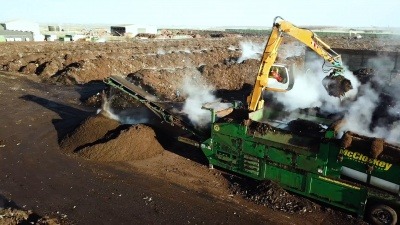UKRI funds £1.2 million Compostable Coalition for packaging
Compostable Coalition UK, an initiative for compostable packaging, has launched after receiving £1.2 million through UK Research and Innovation’s (UKRI) Smart Sustainable Plastic Packaging Challenge.
 Consisting of 10 industry, academia and infrastructure associations – the coalition aims to examine the practicality of collecting, sorting, and treating compostable packaging through existing bio-waste collection and treatment routes.
Consisting of 10 industry, academia and infrastructure associations – the coalition aims to examine the practicality of collecting, sorting, and treating compostable packaging through existing bio-waste collection and treatment routes.
The scheme has been described as the first of its kind, examining the role of compostable packaging in transitioning away from the current reliance on single-use plastics, of which 50 per cent cannot be or is not recycled.
For this reason, the two-year study seeks to inform necessary government policy and legislative interventions to meet key goals of the UK Plastic Pact. The pact aims to see achieve 100 per cent reusability, recyclability, or compostability in packaging, with 70 per cent then effectively and appropriately processed.
Information provided by the project will respond to the Department for Environment, Food, and Rural Affairs (Defra), which has called for further evidence to support the case for the ‘wide inclusion of compostable packaging in UK’s bio-waste treatment streams’.
As part of the coalition, customers of the online retailer Riverford Organic Farmers will participate in a take-back programme. Alongside this, residents of Milton Keynes and shoppers across multiple cafeterias in London will be encouraged to divert compostable packaging into proper food waste bins.
It has also been announced that the packaging producers TIPA, Futamura, Vegware, and Biome will be working to assist in the removal of hard-to-recycle plastics from the market. Hubbub and the University of Sheffield will lead research on consumer behaviour.
Composting facility EnVar and recycling company Paper Round/Recorra are also expected to join the project, alongside trade associations REA and RECOUP.
Bio-waste partners will investigate whether compostable plastic can be sorted and processed to create high-quality compost that can be applied to support soil fertility.
Kate Stansfield, Business Development and Commercial Director at EnVar, said: “EnVar processes around 350,000 tonnes of organic waste each year to make PAS100 accredited compost.
“For a number of years now we have been successfully processing compostable packaging alongside our existing food and garden waste streams. EnVar welcomes its involvement in this project and looks forward to helping produce new data sets to evidence the benefits of this process, to secure the continued support for compostable materials from our industry and Government partners.”
David Proctor, Waste Services Client Manager, Milton Keynes added: “Milton Keynes Council have been collecting food waste successfully from residents for many years and are looking forward to working with this project by exploring how local residents can support the inclusion of compostable plastic in food waste bins.”
Nick Cliffe, Deputy Director, Smart Sustainable Plastic Packaging Challenge, also commented: “We are delighted to offer funding to the Capturing and Processing Compostable Packaging project led by TIPA.
“The research and innovation will further our understanding of how the best outcome for compostable packaging can be delivered in the UK and where these products fit within the sustainable packaging system which the SSPP Challenge seeks to support.”
Julia Schifter, VP of Strategy Analysis at TIPA, finished:“We are confident the project’s findings can successfully signpost the policy and behavioural interventions that will reduce our dependence on hard-to-recycle plastic packaging and achieve the UK Plastics Pact goals.
“All members of the consortium would like to thank UKRI for its generous funding and support of this project.”





